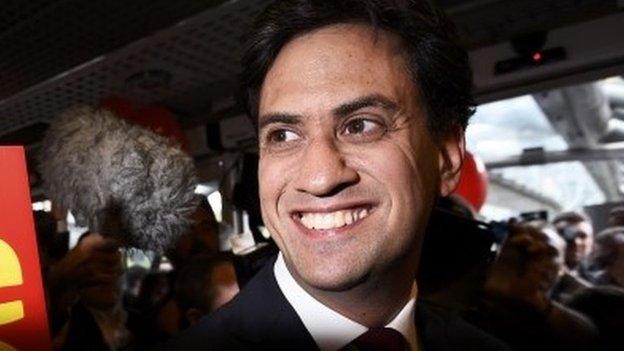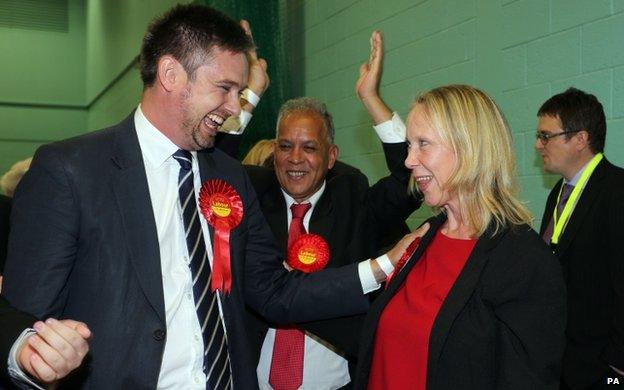Ed Miliband facing sustained glare of scrutiny
- Published

Just after noon today Ed Miliband will get to his feet in the House of Commons expecting to be greeted by a wall of noise.
This will be the first Prime Minister's Questions since that conference speech. The first too since Labour's near-death experience at the hands of UKIP in a by-election they won by just over 600 votes.
Conservative MPs may greet him with their usual ironic cheers or with cat calls about forgetting the deficit or calls to welcome the fall in unemployment - expected to go below two million today
Watching nervously will be dozens of Labour MPs who worry whether he's got what it takes to lead them to victory. MPs who at a meeting earlier this week were urged by Mr Miliband to stay united, to hold their nerve and to keep believing that victory was possible.
Few raised their voices there to criticise, though elsewhere they certainly do. Shadow ministers complain of their "immense frustration" at their leader's failure to take a lead on those other issues he left out of the conference speech - immigration and welfare.
Lib Dem crutch
They note with anxiety that even in Scotland their leader was as little trusted as an English Old Etonian Tory prime minister. They complain that he does not empathise or identify with voters and believes instead that their concerns can be addressed by a well-written lecture to a Westminster think tank.
Yet, for all this, there is no chance of Mr Miliband being replaced as Labour leader. What's more there is every chance that he could be prime minister in less than seven months which is why, say his allies, he stays calm in the face of all this political noise.
It was, they point out, the Tories not Labour who lost a seat to UKIP and did so by a landslide. What's more, even that scarily tight result in the other by-election showed UKIP taking more votes from the Conservatives than from Labour - something which election number-crunchers, like Professor John Curtice of the University of Strathclyde, say could help Mr Miliband to win up to 20 extra seats.

Labour held on in the Heywood and Middleton by-election - just
If UKIP is the Tories' wound, the Lib Dems are Labour's crutch. The defection of those once infected by Clegg-mania explains the difference between Labour's ratings under Brown and Miliband.
Finally, say friends of Ed, it is not "the economy, stupid" that holds the key to the next election but whether people are "feeling it, stupid". That, they say, is why Obama beat Mitt Romney even when the Republican was more trusted with the economy. Here in Britain two thirds of voters tell pollsters they're not feeling the recovery.
Labour MPs have heard all this but still they worry. One backbench critic told me: "When the public paused to glance at us during the conference season our poll lead collapsed. So what on earth will happen when they take a sustained glare?"
Mr Miliband hoped his conference speech would answer calls for him to spell out a vision of life under another Labour government. He believes that the power of government rather than just more public spending can deliver social justice - forcing companies to deliver higher wages, more training and apprenticeships, while reforming markets to ensure consumers get a better deal from banks, train and energy companies.
He could have argued that it was the deficit that made such an approach necessary, but one senior Labour figure told me he is trapped between wanting to seem responsible and wanting to seem radical and now risks being seen as neither.
That is why it is he and not Mr Cameron who for now at least - faces the greater scrutiny.